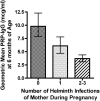Do antenatal parasite infections devalue childhood vaccination?
- PMID: 19478847
- PMCID: PMC2682196
- DOI: 10.1371/journal.pntd.0000442
Do antenatal parasite infections devalue childhood vaccination?
Abstract
On a global basis, both potent vaccine efficacy and high vaccine coverage are necessary to control and eliminate vaccine-preventable diseases. Emerging evidence from animal and human studies suggest that neglected tropical diseases (NTDs) significantly impair response to standard childhood immunizations. A review of efficacy and effectiveness studies of vaccination among individuals with chronic parasitic infections was conducted, using PUBMED database searches and analysis of data from the authors' published and unpublished studies. Both animal models and human studies suggest that chronic trematode, nematode, and protozoan infections can result in decreased vaccine efficacy. Among pregnant women, who in developing countries are often infected with multiple parasites, soluble parasite antigens have been shown to cross the placenta and prime or tolerize fetal immune responses. As a result, antenatal infections can have a significant impact on later vaccine responses. Acquired childhood parasitic infections, most commonly malaria, can also affect subsequent immune response to vaccination. Additional data suggest that antiparasite therapy can improve the effectiveness of several human vaccines. Emerging evidence demonstrates that both antenatal and childhood parasitic infections alter levels of protective immune response to routine vaccinations. Successful antiparasite treatment may prevent immunomodulation caused by parasitic antigens during pregnancy and early childhood and may improve vaccine efficacy. Future research should highlight the varied effects that different parasites (alone and in combination) can have on human vaccine-related immunity. To optimize vaccine effectiveness in developing countries, better control of chronic NTDs may prove imperative.
Conflict of interest statement
The authors have declared that no competing interests exist.
Figures



References
-
- PATH. Available: http://www.path.org/vaccineresources/
-
- World Health Organization. Available: http://www.who.int/immunization_delivery/systems_policy/red/en/index.html.
-
- GAVI Alliance. Available: http://www.gavialliance.org/
-
- Bryce J, Boschi-Pinto C, Shibuya K, Black RE. WHO estimates of the causes of death in children. Lancet. 2005;365:1147–1152. - PubMed
Publication types
MeSH terms
Substances
Grants and funding
LinkOut - more resources
Full Text Sources
Medical
Research Materials

